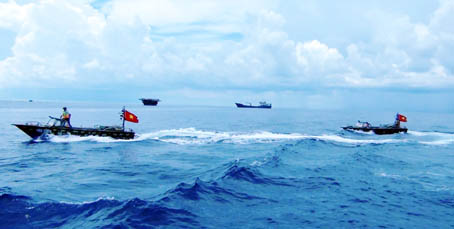Vietnam: Decentralization of coping with incidents of oil and toxic chemical spill
According to Vietnam’s current regulations, coping with incidents of oil and toxic chemical spill is carried out in three levels: grass-root level, regional level and national level. So, how are the regulations on these three levels?

1. Levels of coping with incidents of oil and toxic chemical spill
According to Article 53 of the Law on natural resources and environment of sea and islands 2015 of Vietnam, decentralization of coping with incidents of oil and toxic chemical spill is as follows:
- Grass-root level:
+ If the incident occurs at facilities, the owners thereto must organize, command and mobilize workforces, vehicles and equipment for early coping and at the same time make immediate report to governing body, People’s committees of central-affiliated coastal cities and provinces where the incident occurs; if such incident is out of capacity and resources, make immediate report to governing body, People’s committees of central-affiliated coastal cities and provinces where the incident occurs for support;
+ If the incident causes severe pollution or occurs in the area prioritized for protection, running high or very high risk of pollution, the owners must make the report to People’s committees of central-affiliated cities and provinces where the incident occurs and National Search and Rescue Committee for early direction and coping.
- Regional level:
If the incident is out of capacity with causes not yet determined, presidents of People’s committees of central-affiliated coastal cities and provinces where the incident occurs shall be responsible for giving directions on coping with the incident, and at the same time carrying out urgent mobilization of necessary resources from establishments, sectors and agencies in the administrative divisions for coping.
- National level:
+ If the incident is out of capacity of localities, People’s committees of central-affiliated coastal cities and provinces shall make immediate report to National Search and Rescue Committee for direction and cooperation with relevant agencies for coping;
+ If the incident is out of capacity of the country's forces, National Search and Rescue Committee shall make proposal to the Prime Minister for consideration and decision on calling for international support;
+ In case the incident causes particularly severe pollution, follow regulations on state of emergency.
2. Principles of coping and remedying oil and toxic chemical spill
Coping and remedying oil and toxic chemical spill shall comply with the following principles:
- Coping and remedying oil and toxic chemical spill are responsibilities of agencies, organizations and individuals.
- Focus on the task of prevention; take the initiative in constructing plans, investment in equipment, materials, workforce for coping with oil and toxic chemical spill;
- Incidents of oil and toxic chemical spill must be classified to assign responsibilities for coping.
- Information about oil and toxic chemical spill must be reported and handled in a timely manner.
- Mobilize every resource for coping as quick as possible; ensure effective and close coordination among workforces, vehicles and equipment for coping with oil and toxic chemical spill with activities of rescue and relief being prioritized.
- Ensure safety, prevention and fighting against explosion during the task of coping;
- Any facility that causes oil and toxic chemical spill shall be responsible for handling the incident, remedying pollution and remediating the environment and at the same time making compensation for any damage caused by such incident according to law provisions.
- Prevention, remedial work and handling of oil and toxic chemical spill are instructed in accordance with regulations on environmental protection and relevant law provisions.
This content is specified in Article 52 of the Law on natural resources and environment of sea and islands 2015 of Vietnam.
- Number of deputy directors of departments in Vietnam in accordance with Decree 45/2025/ND-CP
- Cases ineligible for pardon in Vietnam in 2025
- Decree 50/2025 amending Decree 151/2017 on the management of public assets in Vietnam
- Circular 07/2025 amending Circular 02/2022 on the Law on Environmental Protection in Vietnam
- Adjustment to the organizational structure of the Ministry of Health of Vietnam: Certain agencies are no longer listed in the organizational structure
- Vietnam aims to welcome 22-23 million international tourists in Vietnam in 2025
-

- Levels of risk of sea and island environment pollution ...
- 09:51, 12/12/2017
-
.jpg)
- Marine and island environment protection: Acts ...
- 09:20, 12/12/2017
-

- Vietnam: Rights and obligations of organizations ...
- 10:30, 12/11/2017
-

- Vietnam: Contents of sea and island environment ...
- 09:40, 18/03/2016
-

- Notable new policies of Vietnam effective as of ...
- 16:26, 11/04/2025
-
.Medium.png)
- Notable documents of Vietnam in the previous week ...
- 16:21, 11/04/2025
-
.Medium.png)
- Notable documents of Vietnam in the previous week ...
- 16:11, 02/04/2025
-
.Medium.png)
- Notable new policies of Vietnam to be effective ...
- 16:04, 02/04/2025
-
.Medium.png)
- Notable new policies of Vietnam effective from ...
- 14:51, 21/03/2025
 Article table of contents
Article table of contents
